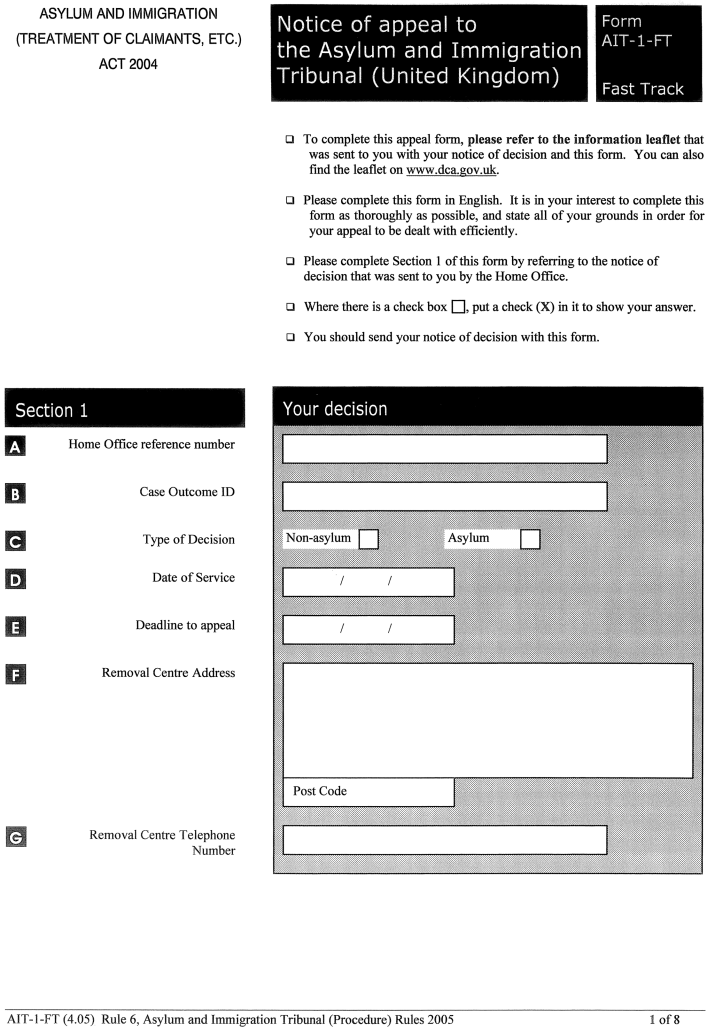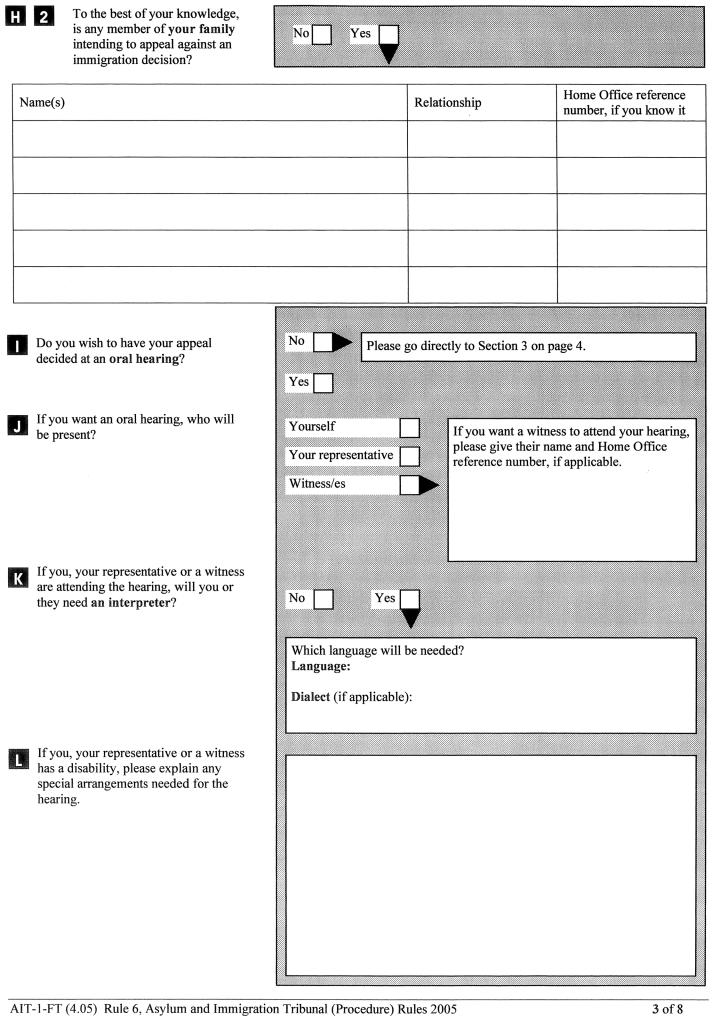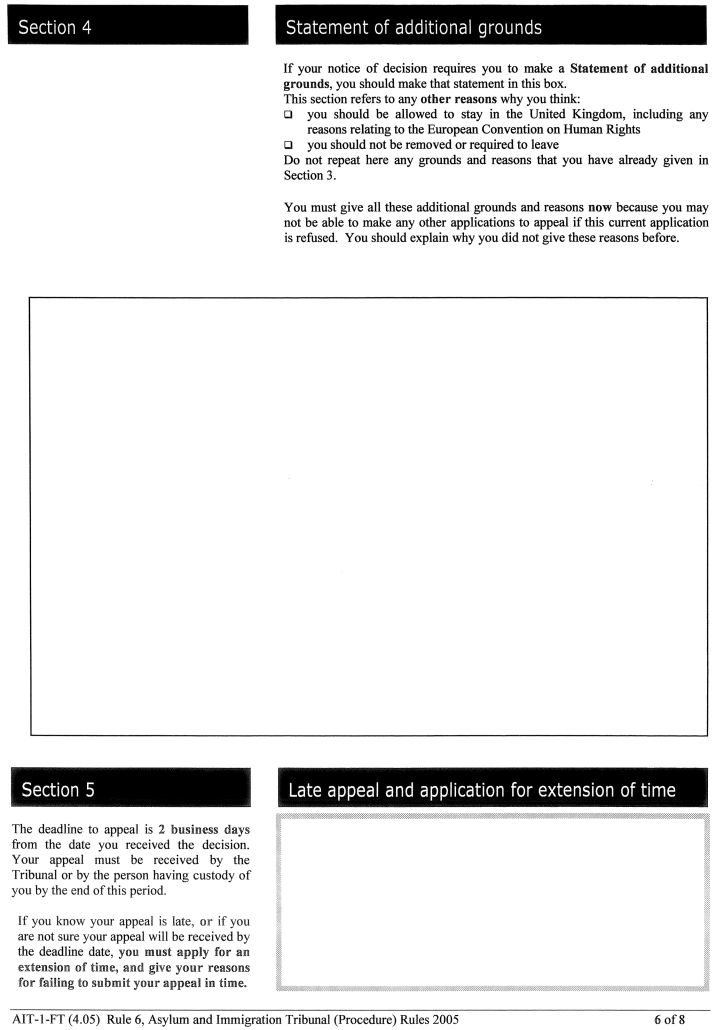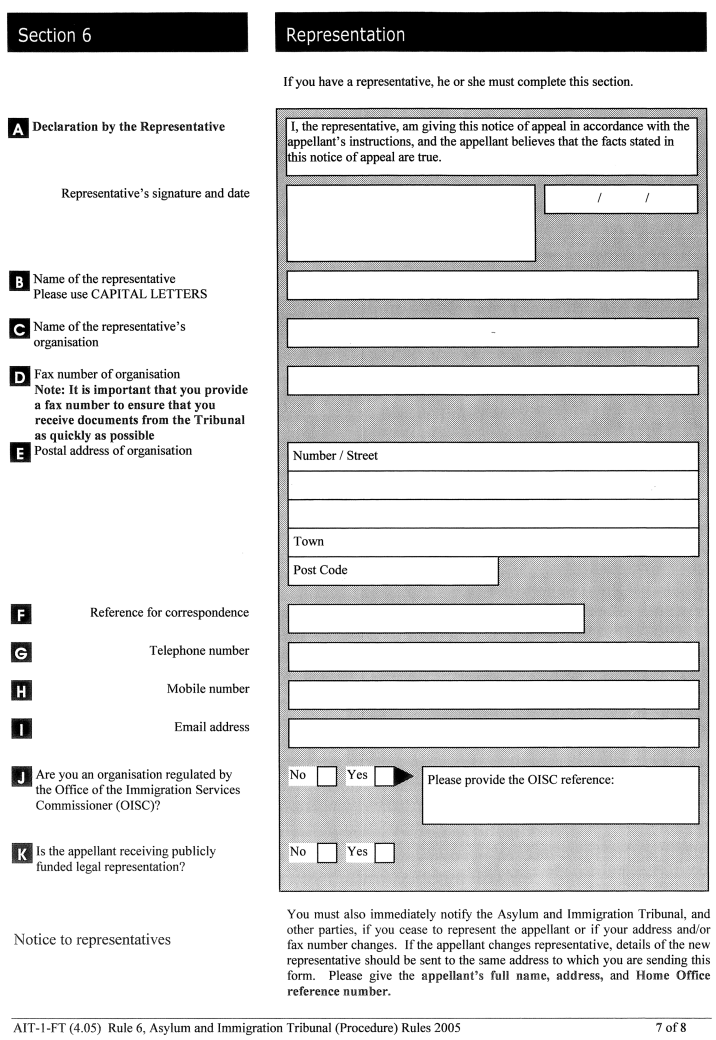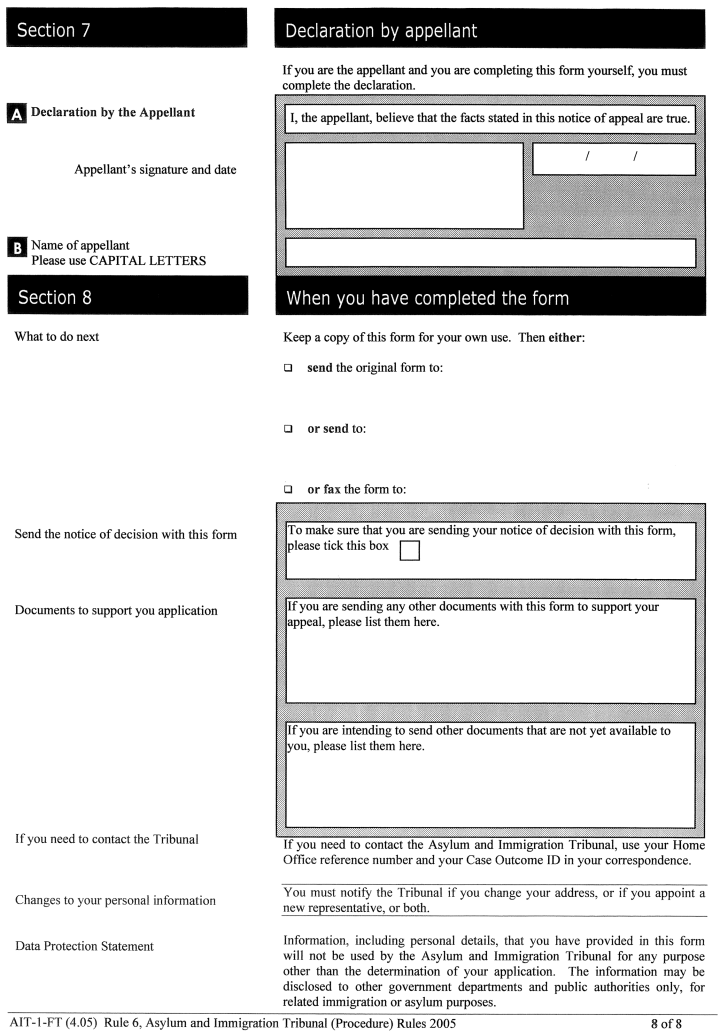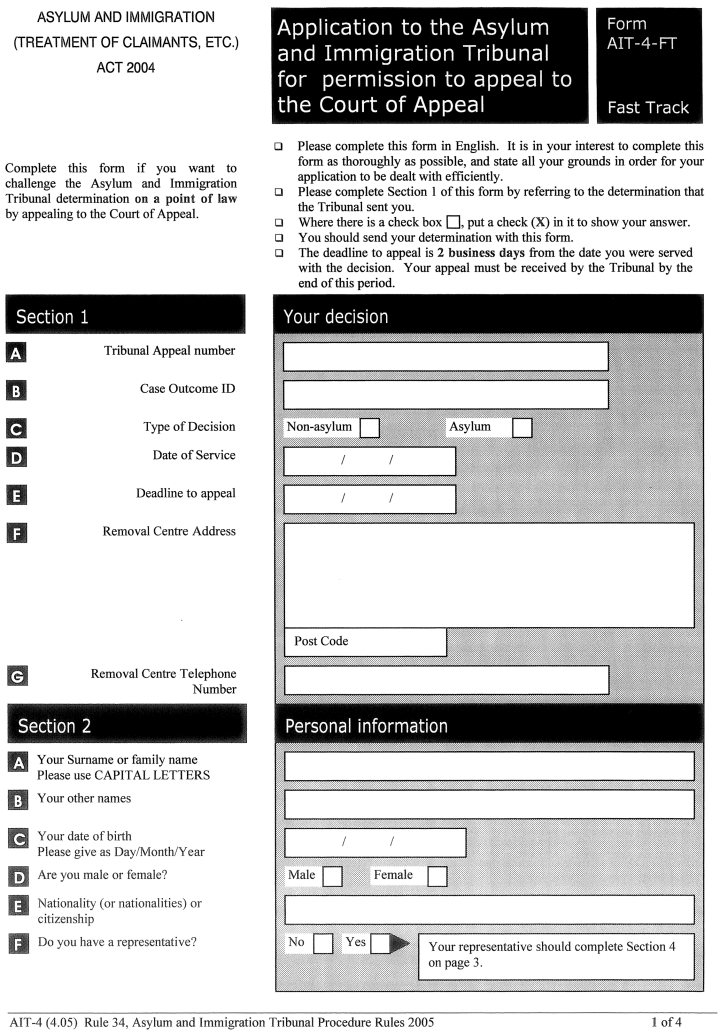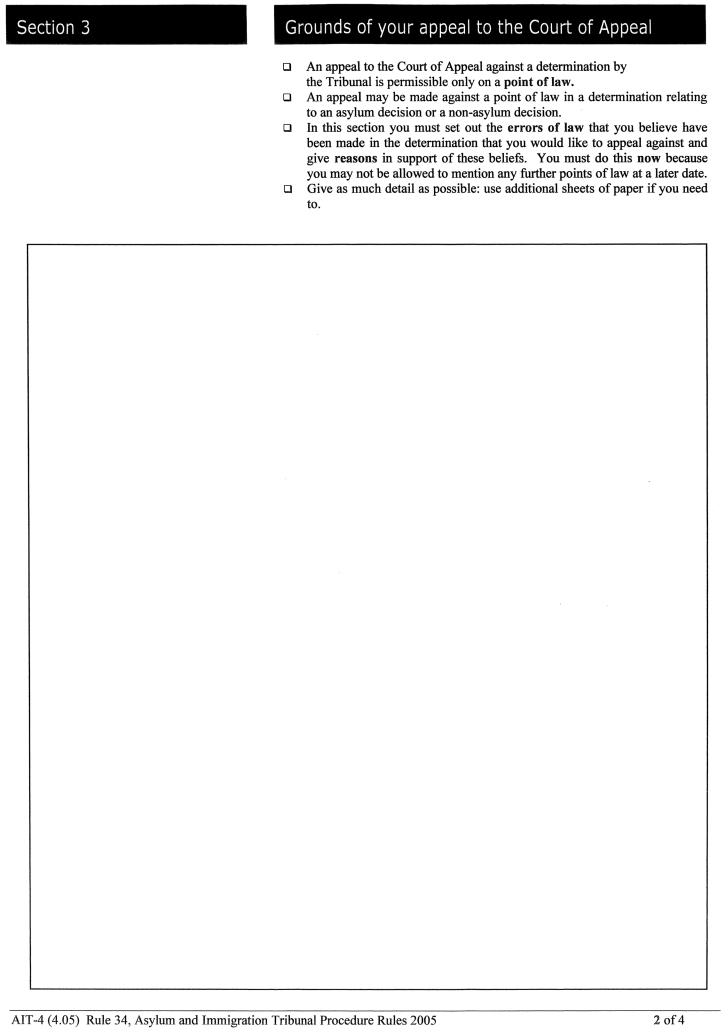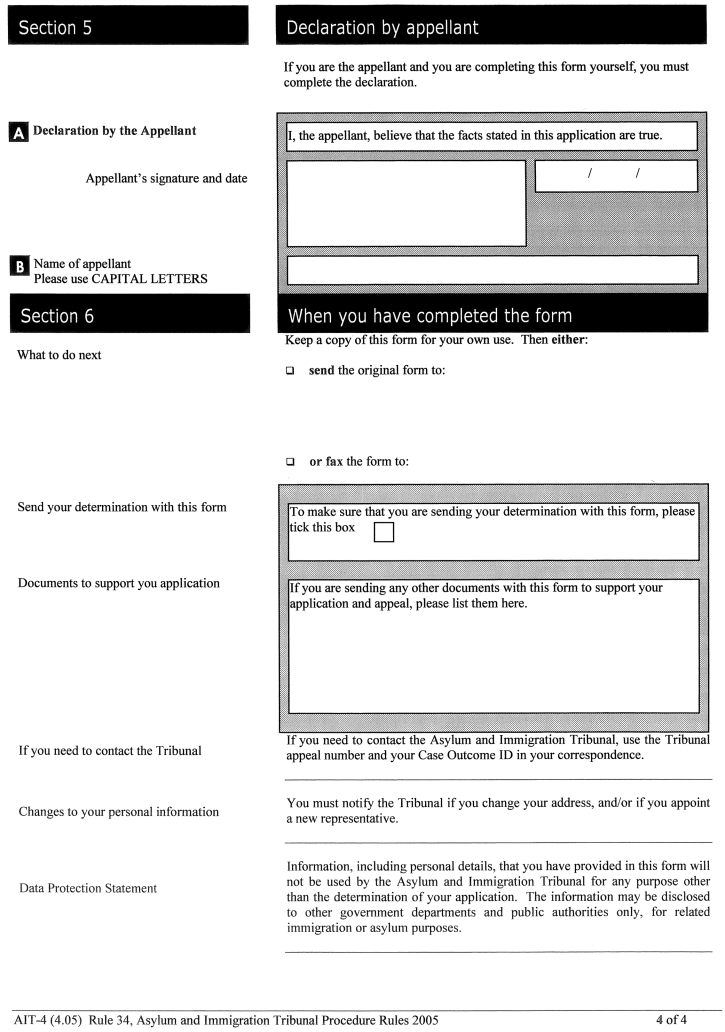Statutory Instruments
2005 No. 560 (L. 12)
IMMIGRATION
The Asylum and Immigration Tribunal (Fast Track Procedure) Rules 2005
Made
7th March 2005
Laid before Parliament
10th March 2005
Coming into force
4th April 2005
The Lord Chancellor, in exercise of the powers conferred by sections 106(1)–(3) and 112(3) of the Nationality, Immigration and Asylum Act 2002(1) and section 40A(3) of the British Nationality Act 1981(2), after consulting with the Council on Tribunals in accordance with section 8 of the Tribunals and Inquiries Act 1992(3), hereby makes the following Rules:
PART 1INTRODUCTION
Citation and commencement
1. These Rules may be cited as the Asylum and Immigration Tribunal (Fast Track Procedure) Rules 2005 and shall come into force on 4th April 2005.
Interpretation
2.—(1) In these Rules, “the Principal Rules” means the Asylum and Immigration Tribunal (Procedure) Rules 2005(4).
(2) Subject to paragraph (3), words and expressions used in these Rules which are defined in rule 2 of the Principal Rules have the same meaning in these Rules as in the Principal Rules.
(3) In these Rules, and in any provision of the Principal Rules which applies by virtue of these Rules, “business day” means any day other than a Saturday or Sunday, a bank holiday, 24th to 31st December, Maundy Thursday, Good Friday or the Tuesday after the last Monday in May.
(4) In a provision of the Principal Rules which applies by virtue of these Rules, a reference to an “appropriate prescribed form” means, in relation to a notice of appeal or an application notice for permission to appeal to the appropriate appellate court, the appropriate form in Schedule 1 to these Rules, or that form with any variations that the circumstances may require.
(5) Where a provision of the Principal Rules applies by virtue of these Rules—
(a)any reference in that provision to the Principal Rules is to be interpreted as including a reference to these Rules; and
(b)any reference in that provision to a specific Part or rule in the Principal Rules is to be interpreted as including a reference to any equivalent Part or rule in these Rules.
Scope of these Rules
3.—(1) Part 2 of these Rules applies to appeals to the Tribunal in the circumstances specified in rule 5.
(2) Part 3 applies to proceedings before the Tribunal of the types described in rule 24 of the Principal Rules in the circumstances specified in rule 15.
(3) Part 4 applies to proceedings before the Tribunal to which Part 2 or 3 applies.
(4) Part 5 applies to proceedings before the Tribunal to which Part 2 or 3 applies or has applied.
(5) For the purpose of rules 5 and 15, a party does not cease to satisfy a condition that he must have been continuously in detention under the Immigration Acts at a place or places specified in Schedule 2 to these Rules by reason only of—
(a)being transported from one place of detention specified in that Schedule to another place which is so specified; or
(b)leaving and returning to such a place of detention for any purpose between the hours of 6 a.m. and 10 p.m.
Application of the Principal Rules
4.—(1) Rule 4 of the Principal Rules (Overriding objective) applies to these Rules.
(2) Where Part 2 or 3 of these Rules applies to proceedings before the Tribunal, the Principal Rules also apply to the extent specified in rules 6, 16, 20, 24 and 27 of these Rules.
PART 2Appeals to the Tribunal
Scope of this Part
5.—(1) This Part applies to an appeal to the Tribunal where the person giving notice of appeal—
(a)was in detention under the Immigration Acts at a place specified in Schedule 2 when he was served with notice of the immigration decision against which he is appealing; and
(b)has been continuously in detention under the Immigration Acts at a place or places specified in Schedule 2 since that notice was served on him.
(2) This Part shall cease to apply if the Tribunal makes an order under rule 30(1).
Application of Part 2 of the Principal Rules
6. Where this Part applies to an appeal, the following provisions of Part 2 of the Principal Rules apply—
(a)rule 6(1) to (3), omitting the reference to rule 6(4) in rule 6(2);
(b)rule 8;
(c)rule 10(1);
(d)rule 13(1) and (4);
(e)rule 14; and
(f)rules 17 to 19.
Giving notice of appeal
7. Where a notice of appeal is served on a custodian under rule 6(3)(b) of the Principal Rules, the custodian must—
(a)endorse on the notice the date that it is served on him; and
(b)forward it to the Tribunal immediately.
Time limit
8.—(1) A person who wishes to appeal must give a notice of appeal not later than 2 days after the day on which he is served with notice of the immigration decision against which he is appealing.
(2) Where a notice of appeal is given outside the time limit in paragraph (1), the Tribunal must not extend the time for appealing unless it is satisfied that, because of circumstances outside the control of the person giving notice of appeal or his representative, it was not practicable for the notice of appeal to be given within that time limit.
Service of notice of appeal on respondent
9. When the Tribunal receives a notice of appeal it shall immediately serve a copy upon the respondent.
Filing of documents by respondent
10. The respondent must file the documents listed in rule 13(1) of the Principal Rules not later than 2 days after the day on which the Tribunal serves the respondent with the notice of appeal.
Listing
11.—(1) The Tribunal shall fix a hearing date which is—
(a)not later than 2 days after the day on which the respondent files the documents under rule 10; or
(b)if the Tribunal is unable to arrange a hearing within that time, as soon as practicable thereafter.
(2) The Tribunal must serve notice of the date, time and place of the hearing on every party as soon as practicable, and in any event not later than noon on the business day before the hearing.
Deciding timeliness issues
12.—(1) The Tribunal shall consider any issue as to—
(a)whether a notice of appeal was given outside the applicable time limit; and
(b)whether to extend the time for appealing where the notice of appeal was given outside that time limit,
as a preliminary issue at the hearing fixed under rule 11, subject to paragraph (2) of this rule.
(2) Rule 13 applies to the consideration and decision of such an issue as it applies to the consideration and determination of an appeal.
(3) Where the notice of appeal was given outside the applicable time limit and the Tribunal does not grant an extension of time, the Tribunal must take no further action in relation to the notice of appeal, except that it must serve written notice of its decision under this rule on the parties not later than 1 day after the day on which that decision is made.
Method of determining appeal
13. The Tribunal must consider the appeal at the hearing fixed under rule 11 except where—
(a)the appeal—
(i)lapses pursuant to section 99 of the 2002 Act;
(ii)is treated as abandoned pursuant to section 104(4) of the 2002 Act;
(iii)is treated as finally determined pursuant to section 104(5) of the 2002 Act; or
(iv)is withdrawn by the appellant or treated as withdrawn in accordance with rule 17 of the Principal Rules;
(b)the Tribunal adjourns the hearing under rule 28 or 30(2)(a) of these Rules; or
(c)all of the parties to the appeal consent to the Tribunal determining the appeal without a hearing.
Giving of determination
14.—(1) Where the Tribunal determines an appeal, it must give a written determination containing its decision and the reasons for it.
(2) The Tribunal must serve its determination on every party to the appeal—
(a)if the appeal is considered at a hearing, not later than 2 days after the day on which the hearing of the appeal finishes; or
(b)if the appeal is determined without a hearing, not later than 2 days after the day on which it is determined.
PART 3Reconsideration of Appeals, etc.
Scope of this Part
15.—(1) This Part applies to proceedings before the Tribunal of a type specified in rule 24 of the Principal Rules, where—
(a)Part 2 of these Rules applied at all times to the appeal to the Tribunal;
(b)Part 3 of these Rules applied at all times to any other proceedings before the Tribunal of a type specified in rule 24 of the Principal Rules which related to that appeal; and
(c)the appellant has been continuously in detention under the Immigration Acts at a place or places specified in Schedule 2 to these Rules since being served with notice of the immigration decision against which he is appealing.
(2) This Part shall cease to apply if the Tribunal makes an order under rule 30(1).
SECTION 1Section 103A applications considered by members of the Tribunal
Application of Section 1 of Part 3 of the Principal Rules
16. Where this Part applies to a section 103A application, the following provisions of Section 1 of Part 3 of the Principal Rules apply—
(a)rule 25;
(b)rule 26, omitting paragraphs (2) and (4) of that rule;
(c)rule 27(1) and (2); and
(d)rule 28.
Service of application and response
17. Where a section 103A application to which this Part applies is filed with the Tribunal—
(a)the Tribunal must serve copies of the application notice and any documents which were attached to it on the party to the appeal other than the party who made the section 103A application as soon as practicable; and
(b)the party to the appeal other than the party who made the section 103A application may file submissions in response to the application not later than 1 day after the day on which it is served with the application.
Method of deciding applications for review
18. The immigration judge shall decide the application without a hearing, and by reference only to—
(a)the applicant’s written submissions and the documents filed with the application notice; and
(b)any submissions filed in response to the application under rule 17(b).
Service of decision
19. The Tribunal must serve a copy of the notice of decision and any directions given under rule 27(2)(b) of the Principal Rules on every party to the appeal—
(a)if submissions were filed in response to the application under rule 17(b), not later than 1 day after they were filed; or
(b)if no submissions were filed within the period specified in rule 17(b), not later than 1 day after the end of that period.
SECTION 2Reconsideration of appeals
Application of the Principal Rules
20.—(1) Where this Part applies to the reconsideration of an appeal, the following provisions of Section 2 of Part 3 of the Principal Rules apply—
(a)rule 31(2) to (5); and
(b)rule 32(1).
(2) Rules 17 to 19 and Part 5 of the Principal Rules apply, with any necessary modifications, to the reconsideration of an appeal under this Part to the extent that they would apply to the initial determination of an appeal under Part 2 of these Rules.
Procedure for reconsideration of appeal
21.—(1) Where an order for reconsideration has been made, the Tribunal must fix a hearing date for the reconsideration of its decision on the appeal which is—
(a)not later than 2 days after the day on which that order has been served on both parties to the appeal; or
(b)if the Tribunal is unable to arrange a hearing within that time, as soon as practicable thereafter.
(2) The Tribunal must serve notice of the date, time and place of the reconsideration hearing on every party not later than noon on the business day before the hearing.
Fresh evidence on reconsideration of appeal
22.—(1) If a party wishes to ask the Tribunal to consider evidence which was not submitted on any previous occasion when it considered the appeal, he must notify the Tribunal and the other party of—
(a)the nature of the evidence; and
(b)the reasons why it was not submitted on any previous occasion.
(2) Wherever practicable, notification under paragraph (1) must be given before the date fixed for the reconsideration hearing under rule 21.
Determination on reconsideration
23.—(1) The Tribunal must reconsider its decision on the appeal at the hearing fixed under rule 21 except where—
(a)any of the circumstances set out in rule 13 applies;
(b)a party has failed to comply with a provision of these Rules or a direction of the Tribunal, and the Tribunal is satisfied that in all the circumstances, including the extent of the failure and any reasons for it, it is appropriate to reconsider its decision on the appeal without a hearing; or
(c)the Tribunal is satisfied, having regard to the material before it and the nature of the issues raised, that its decision on the appeal can be justly reconsidered without a hearing.
(2) Rule 14 applies to the reconsideration of an appeal as it applies to the initial determination of an appeal.
SECTION 3Applications for permission to appeal to the appropriate appellate court
Application of Section 3 of Part 3 of the Principal Rules
24. Where this Part applies to an application for permission to appeal to the appropriate appellate court, the following provisions of Section 3 of Part 3 of the Principal Rules apply—
(a)rule 34(1) to (3); and
(b)rule 36.
Time limits for filing and serving application
25.—(1) An application notice for permission to appeal must be filed not later than 2 days after the day on which the appellant is served with the Tribunal’s determination.
(2) The Tribunal may not extend the time limit in paragraph (1).
(3) Immediately upon an application notice for permission to appeal being filed, the Tribunal must notify the other party to the appeal to the Tribunal that it has been filed.
Time limit for determining the application
26. The Tribunal must determine the application for permission to appeal, and serve its determination on every party, not later than 1 day after the day on which the Tribunal receives the application notice.
PART 4General Provisions
Application of Part 5 of the Principal Rules
27. Where this Part applies, Part 5 of the Principal Rules applies, except that—
(a)rule 47 applies subject to rule 28 of these Rules; and
(b)rule 60(2) does not apply.
Adjournment
28. The Tribunal may only adjourn a hearing where—
(a)it is necessary to do so because there is insufficient time to hear the appeal or application which is before the Tribunal;
(b)a party has not been served with notice of the hearing in accordance with these Rules;
(c)the Tribunal is satisfied by evidence filed or given by or on behalf of a party that—
(i)the appeal or application cannot be justly determined on the date on which it is listed for hearing; and
(ii)there is an identifiable future date, not more than 10 days after the date on which the appeal or application is listed for hearing, by which it can be justly determined; or
(d)the Tribunal makes an order under rule 30.
Correction of orders and determinations
29. Where an order, notice of decision or determination is amended under rule 60(1) of the Principal Rules, the Tribunal must, not later than 1 day after making the amendment, serve an amended version on every party on whom it served the original.
PART 5Removal of Pending Proceedings from Fast Track
Transfer out of fast track procedure
30.—(1) Where Part 2 or 3 of these Rules applies to an appeal or application, the Tribunal must order that that Part shall cease to apply—
(a)if all the parties consent;
(b)if it is satisfied by evidence filed or given by or on behalf of a party that there are exceptional circumstances which mean that the appeal or application cannot otherwise be justly determined; or
(c)if—
(i)the respondent to the appeal has failed to comply with a provision of these Rules, or the Principal Rules as applied by these Rules, or a direction of the Tribunal; and
(ii)the Tribunal is satisfied that the appellant would be prejudiced by that failure if the appeal or application were determined in accordance with these Rules.
(2) When making an order under paragraph (1), the Tribunal may—
(a)adjourn any hearing of the appeal or application; and
(b)give directions relating to the further conduct of the appeal or application.
(3) Where the Tribunal adjourns a hearing under paragraph (2)(a)—
(a)it must fix a new date, time and place for the hearing; and
(b)in the case of an adjournment of an appeal, rule 21(4) of the Principal Rules shall apply.
Application of the Principal Rules on transfer out of fast track
31.—(1) This rule applies where Part 2 or 3 of these Rules ceases to apply to an appeal or application because—
(a)the conditions in rule 5 or 15 cease to apply; or
(b)the Tribunal makes an order under rule 30(1).
(2) Subject to paragraph (3), the Principal Rules shall apply to the appeal or application from the date on which these Rules cease to apply.
(3) Where—
(a)a period of time for doing something has started to run under a provision of these Rules; and
(b)that provision ceases to apply,
if the Principal Rules contain a time limit for doing the same thing, the time limit in the Principal Rules shall apply, and the relevant period of time shall be treated as running from the date on which the period of time under these Rules started to run.
PART 6Revocation and Transitional Provisions
Revocation
32. The Immigration and Asylum Appeals (Fast Track Procedure) Rules 2003(5) are revoked.
Transitional provisions
33.—(1) Subject to the following paragraphs of this rule, these Rules apply to any pending appeal or application to an adjudicator or the Immigration Appeal Tribunal which was subject to the 2003 Fast Track Rules immediately before 4th April 2005, and which continues on or after that date as if it had been made to the Tribunal by virtue of a transitional provisions order.
(2) Where a notice of a relevant decision has been served before 4th April 2005 and the recipient gives notice of appeal against the decision on or after 4th April 2005—
(a)rules 7 to 10 of these Rules, and rules 6(1) to (3), 8 and 13(1) and (4) of the Principal Rules, shall not apply; and
(b)rule 6 of the 2003 Fast Track Rules and rules 6 and 8 of the 2003 Principal Rules shall continue to apply as if those rules had not been revoked, with the modification that references to an adjudicator or the appellate authority shall be treated as referring to the Tribunal.
(3) Where a notice of appeal to an adjudicator has been given before 4th April 2005, but the respondent has not filed the notice of appeal with the appellate authority in accordance with rule 6(3)(a) of the 2003 Fast Track Rules—
(a)rules 9 and 10 of these Rules, and rule 13(1) and (4) of the Principal Rules, shall not apply; and
(b)rule 6(3) of the 2003 Fast Track Rules shall continue to apply as if it had not been revoked, with the modification that the reference to the appellate authority shall be treated as referring to the Tribunal.
(4) Where, pursuant to a transitional provisions order, the Tribunal reconsiders an appeal which was originally determined by an adjudicator, Section 2 of Part 3 shall apply to the reconsideration, subject to paragraph (5).
(5) Where—
(a)a party has been granted permission to appeal to the Immigration Appeal Tribunal against an adjudicator’s determination before 4th April 2005, but the appeal has not been determined by that date; and
(b)by virtue of a transitional provisions order the grant of permission to appeal is treated as an order for the Tribunal to reconsider the adjudicator’s determination,
the reconsideration shall be limited to the grounds upon which the Immigration Appeal Tribunal granted permission to appeal.
(6) In relation to proceedings which were pending immediately before 4th April 2005—
(a)unless the Tribunal directs otherwise—
(i)anything done or any directions given before 4th April 2005 under the 2003 Fast Track Rules shall continue to have effect on and after that date;
(ii)anything done or any directions given by the appellate authority shall be treated as if done or given by the Tribunal; and
(iii)any document served on the appellate authority shall be treated as if served on the Tribunal;
(b)unless the context requires otherwise, any reference in a document to an adjudicator, the Immigration Appeal Tribunal or the appellate authority shall, insofar as it relates to an event on or after 4th April 2005, be treated as a reference to the Tribunal.
(7) In this rule—
(a)“the 2003 Fast Track Rules” means the Immigration and Asylum Appeals (Fast Track Procedure) Rules 2003;
(b)“the 2003 Principal Rules” means the Immigration and Asylum Appeals (Procedure) Rules 2003(6);
(c)“adjudicator” and “appellate authority” have the same meaning as in the 2003 Fast Track Rules and 2003 Principal Rules; and
(d)“a transitional provisions order” means an order under section 48(3)(a) of the 2004 Act containing transitional provisions.
Falconer of Thoroton, C.
7th March 2005
Rule 2(4)
SCHEDULE 1FORMS
AIT 4 FTApplication to the Asylum and Immigration Tribunal for permission to appeal to the Court of Appeal or Court of Session—Fast Track
Rules 5 and 15
SCHEDULE 2SPECIFIED PLACES OF DETENTION
Campsfield House Immigration Removal Centre, Kidlington, Oxfordshire
Colnbrook House Immigration Removal Centre, Harmondsworth, Middlesex
Harmondsworth Immigration Removal Centre, Harmondsworth, Middlesex
Yarls Wood Immigration Removal Centre, Clapham, Bedfordshire
Explanatory Note
(This note is not part of the Rules)
These Rules prescribe a “fast track” procedure for appeals and applications to the Asylum and Immigration Tribunal, where the appellant is in detention under the Immigration Acts at the locations listed in Schedule 2. The Rules come into force on 4th April 2005.
The Tribunal is established under section 81 of and Schedule 4 to the Nationality, Immigration and Asylum Act 2002, as substituted by section 26(1) of and Schedule 1 to the Asylum and Immigration (Treatment of Claimants, etc.) Act 2004. The general procedures for appeals and applications to the Tribunal are set out in the Asylum and Immigration Tribunal (Procedure) Rules 2005 (“the Principal Rules”).
Parts 1 to 4 of these Rules specify the extent to which the Principal Rules apply to fast track appeals and applications, modify certain provisions of the Principal Rules and make different provision for certain matters. The circumstances in which those Parts apply are set out in rules 3, 5 and 15.
The procedure under these Rules differs from that under the Principal Rules principally in the following ways—
(a)there are shorter time limits for the parties and the Tribunal to take certain steps (rules 7 to 12, 14, 19, 21, 23, 25 and 26);
(b)the procedures for deciding certain issues are simplified or modified to reflect the shorter timetable in fast track proceedings (rules 12, 13, 22 and 28);
(c)in all fast track cases, including cases where the appeal relates in whole or in part to an asylum claim, the Tribunal must serve its determinations and decisions on every party to the appeal (rules 14, 19 and 23); and
(d)in the fast track, an application under section 103A of the 2002 Act must be served on the party to the appeal other than the applicant, who may file submissions in response to the application, which the immigration judge must consider (rules 17 and 18).
Part 5 specifies the circumstances in which the Tribunal may direct that an appeal or application is to be taken out of the fast track procedure, and the rules which apply when the fast track procedure ceases to apply. Part 6 revokes the Immigration and Asylum Appeals (Fast Track Procedure) Rules 2003 and contains transitional provisions.
Where these Rules apply, the time limits for applications under section 103A of the 2002 Act are varied by the Asylum and Immigration (Fast Track Time Limits) Order 2005.
2002 c. 41. Sections 106(1)–(3) were amended by paragraph 21 of Schedule 2 to the Asylum and Immigration (Treatment of Claimants, etc.) Act 2004 (c. 19).
1981 c. 61. Section 40A was inserted by section 4(1) of the Nationality, Immigration and Asylum Act 2002 (c. 41) and amended by paragraph 4 of Schedule 2 to the Asylum and Immigration (Treatment of Claimants, etc.) Act 2004 (c. 19).

